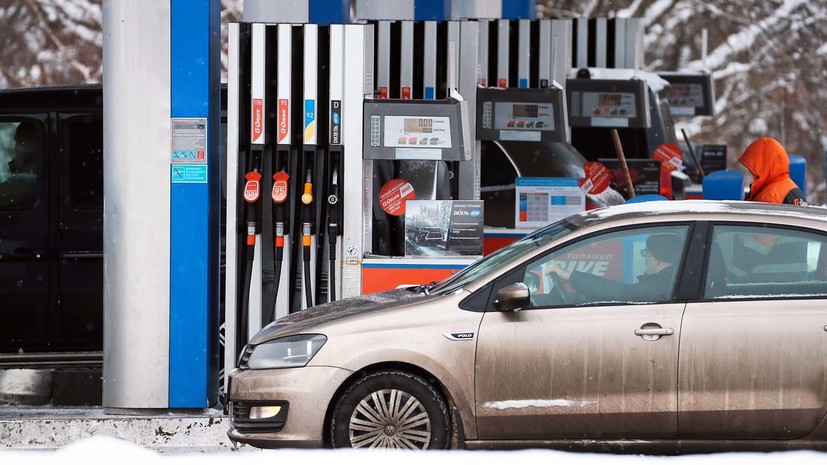Since the beginning of 2020, the cost of fuel in Russia has shown a slight increase. According to the Federal State Statistics Service, at the end of December 2019, the average price level for AI-92 and AI-95 gasoline was 42.24 and 45.76 rubles per liter, respectively, and as of January 20, the figures reached 42.35 and 45, 8 rubles.
A slight increase in fuel prices occurred in most Russian regions. Most notably, the average price level increased in the North Caucasus and Far East Federal Districts - by 14 and 37 kopecks, to 45.26 and 46.37 rubles per liter. The exception was the Ural Federal District, where since the beginning of January gasoline fell by an average of 4 kopecks - up to 44.68 rubles per liter.
At the same time, the cost of diesel fuel increased throughout the country and increased by an average of 37 kopecks to 48.09 rubles per liter.
“The increase in fuel prices observed at the beginning of the year is largely due to an increase in excise taxes. Since January 1, excise tax rates on gasoline and diesel fuel have increased by about 3.5%. Next time, we will see a similar effect only after a year, when rates will rise by another 4%. Corresponding changes have already been incorporated in the Tax Code, ”commented Finam Group analyst Alexei Kalachev in an interview with RT.
It is noteworthy that already in the third week of January, the rise in gas prices in Russia practically stopped, while diesel fuel continued to rise moderately. Experts attribute this situation to a sharp increase in the cost of fuel abroad.
“In the first half of January, it was possible to observe an increase in fuel prices in Europe. The fact is that Russia supplies abroad about 70% of diesel fuel and about 10-11% of gasoline. Therefore, the cost of the Russian diesel engine is more sensitive to changes in prices in foreign markets, ”added Kalachev.
In addition, the increase in the cost of fuel was affected by changes in the formula of the compensating mechanism. This was in a conversation with RT told the head of the Russian Fuel Union Yevgeny Arkush.
Recall that after a sharp rise in the price of fuel in 2018, the government agreed with oil companies to freeze wholesale prices. At the same time, it was unprofitable for oil companies to supply fuel to the Russian market at a fixed cost. Export prices significantly exceeded domestic prices, so it was more profitable for businesses to sell oil products only abroad. Starting January 1, 2019, the state will compensate companies for lost revenues from fuel supplies to the domestic market.
In the second half of 2019, oil companies were reimbursed 75% of revenues from the sale of gasoline and 70% from diesel fuel. Meanwhile, from January 1, 2020, the amount of compensation decreased to 68% and 60%, respectively. As noted by Eugene Arkush, the changes primarily provoked an increase in the wholesale cost of fuel. At the same time, retail prices for gasoline and diesel in Russia are still growing slower than inflation.
It should be noted that as a result of the compensating mechanism, the rise in gas prices in Russia slowed down by almost five times - from 9.4% in 2018 to 1.9% in 2019. Such data leads Rosstat. Although the compensation amount for the oil industry has declined somewhat, the current payment system will continue to be a key deterrent to prices in 2020.
“In general, if it were not for the compensation mechanism developed by the government group, Russian motorists and enterprises would now have faced a 3-4-ruble rise in gasoline,” Peter Pushkaryov, TeleTrade chief analyst, explained to RT.
The interviewed analysts do not exclude the introduction of new changes in the compensatory mechanism after a change in the composition of the government. However, after that, experts do not expect a sharp increase in fuel prices until the end of the year.
“Right now there is an unspoken rule between oil workers and the authorities, but with the change of government, the situation could potentially change. However, I think that in any case, the country's leadership will try to prevent the same serious price hike that it was in 2018, ”said the head of the investment department of BCS Broker in an interview with RT.
According to Alexei Kalachev, in 2020, one of the reasons for the rise in price of fuel will also be high competition between fuel producers and gas stations. At the same time, rising prices will be restrained by excessive production volumes and low consumer demand. Moreover, fluctuations in world oil prices will also affect the price of gasoline.
“The cost of oil on world markets after an attempt at new growth at the beginning of the year is now declining. This also does not give reasons for the rise in price of oil products. Taking into account all the factors influencing the market today, I believe that the increase in fuel prices will be able to be kept within the framework of official inflation - within the range of 3.5-4%, ”concluded Kalachev.

